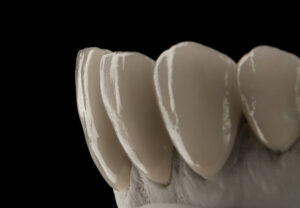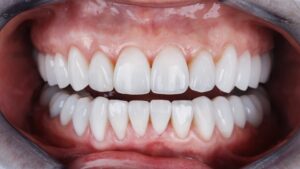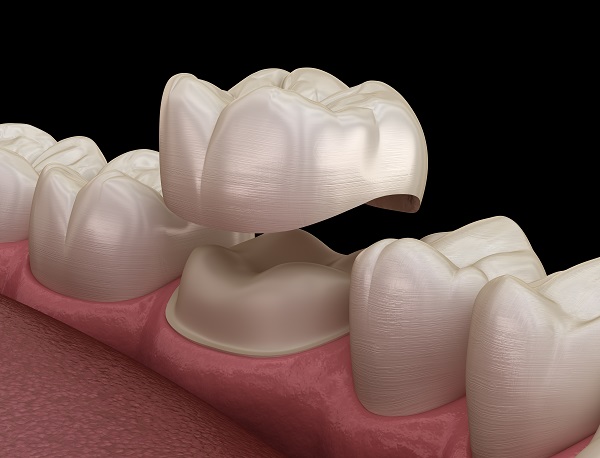
Dental Crowns – Why Do You Need Them?
A dental crown is an artificial cap or cover for the tooth. It is designed to strengthen a tooth when there isn’t enough tooth structure remaining to keep it functional.It is a custom-made covering for your damaged tooth to restore the tooth’s size, shape, strength and enhance its appearance. The dentist near you fixes the cap or crown on your natural tooth, to cover your entire tooth which is helpful in protecting the cracked, damaged or excessively decayed tooth. It helps in restoring the original shape, size, and function of the tooth. Crowns are also used to cover stained or misshaped teeth, to get that dream smile which improves your appearance and confidence.
Each crown is customised to your specific needs and anatomy. These are made up of different materials but usually ceramic or porcelain.
Why Would I Need a Dental Crown?
Dental crowns improve the appearance and protect the tooth from future problems by maintaining their integrity. Crowns are helpful in various conditions however, there are various oral conditions which can pose many issues. Therefore, it is advisable to visit the best dentist in Delhi and get regular check-ups and treatment. The most common situations in which dental crowns are useful are cracked, crooked or discoloured teeth. It is mandatory to give a crown after the root canal treatment to strengthen the teeth and dental implants to cover them.
You may need a dental crown for several reasons, including:
- Helps in getting the perfect shape, size, colour and alignment of your teeth by fixing discoloured, spaced or crowded teeth.
- Useful for covering a dental implant
- Helpful in restoring a tooth after a root canal treatment.
- Protecting a chipped, cracked or loose tooth.
- Restoring a severely sensitive worn off tooth (whose nerves have been exposed).
- Restoring a tooth with a large filling and not much tooth structure remaining for holding the filling
- Holding a bridge in place (for replacement of missing teeth).
What are the Types of Dental Crowns?
There are mainly two types of dental crowns:
- Permanent Crowns – precious/noble metals viz… gold, all ceramic/porcelain, resin materials, porcelain-fused-to-metal.
- Temporary Crowns – Primarily stainless steel or acrylic-based material.
They are of different materials as per the needs of the patients. The best dental clinic in Delhi examines the patient and suggests the dental crowns that best fit their requirement. Smile Delhi’ consider various factors such as the shape, size, colour and strength of the teeth.
Let us find out in detail about these different types of crowns.
1. All-Porcelain or Ceramic
These crowns are tooth-coloured and look life like. They resemble natural teeth and can be used on any tooth, including the front ones. The porcelain crowns may seem expensive but have good quality and durability. These are (CAD CAM) which means these are computer aided manufactured and designed. It makes their margins very precise with the gums, so that no food and saliva could penetrate under them. They are stain-resistant and transmit light giving them tooth like appearance.
- These crowns are ideally suggested to everyone because nobody wants to have metal in their mouth. Also, to people who prefer something which has a natural appearance as they are the most cosmetically pleasing crowns.
- The material used is ‘bio-compatible’ which is kind to your gums and tissues
- There is no risk of any allergic reaction or sensitivity to hot or cold food.
Whether you require veneers, crowns or a fixed bridge, the use of ceramic can provide the aesthetics, longevity and durability you desire.
There are two types of ceramic crown:
- Zirconia – These crowns are high on strength and are ideally used for back teeth.
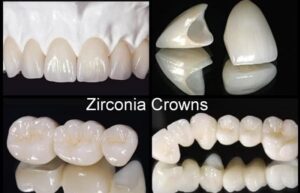
- E-Max – These crowns are high on aesthetics and are ideally used for front teeth.
Porcelain Fused to Metal
Porcelain-fused-to-metal crowns are also known as PFM crowns. The inner part of the crown consists of metal alloys and the outer part is made up of Porcelain. Metal in the core helps to provide strength to the crown and porcelain is helpful to give the outer part of the crown shape and colour. In making porcelain-fused-to-metal crowns, they fire ceramic on the metal base. They are quite durable and dentists near you choose them for mostly back teeth. They match the look of natural teeth as it has ceramic as its outer layer. They are often preferred by people for they cost lesser than the all-ceramic ones.
However, sometimes the metal under the porcelain cap shows through as a dark line. Other cons include the chance of the crown’s porcelain portion chipping or breaking off exposing the metallic layer. Porcelain-fused-to-metal dental crowns can be a good choice for back teeth.
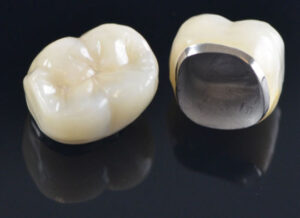
2. Gold Crowns
Gold has been the most bio compatible material in your mouth. These crowns are made up of gold alloy which rarely chip or break. It is durable and can withstand biting and chewing pressure. However, these crowns are not aesthetically pleasing because of the colour. These crowns are most suitable for the back teeth.
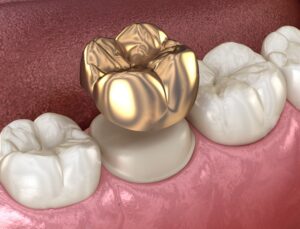
3. Acrylic Temporary Crowns
Acrylic or all resin crown or cap is made up of resin material. These are temporary composite resin materials which can match the colour of the teeth. The most common materials used are silicon dioxide resin, acrylic polymer resin, and more. Resin crowns are metal-free. As the resin crowns wear down quickly, they are helpful only as a temporary measure.
4. Stainless Steel Crowns
The dentist suggests stainless steel crowns in kids to protect the tooth. These stainless-steel crowns are also an effective solution in kids dentistry. They are more beneficial for children’s primary teeth or milk teeth issues to prevent further decay. When the permanent teeth start erupting along with the milk teeth, the crown falls off automatically.
5. All-Metal Crowns
Metal dental crowns consist of alloys with gold or platinum. They also come in other base-metal alloys like cobalt-chromium and nickel-chromium. It does not require more tooth structure to be removed; as a result, there is maximum retention and strength. They also have a great capacity to withstand biting and chewing. They are the strongest of all the crowns. However, the only disadvantage is the colour of the crown. That is why metal crowns are primarily preferable for back teeth.
What to Expect During a Dental Crown Procedure?
You will typically visit the dentist twice for a dental crown treatment. In some cases, you may have a dental crown made in your dentist’s office.
The First Visit
During the first visit, the tooth that’s going to receive the crown is examined and prepared. X-rays are taken of the tooth and its strength in the surrounding bone is assessed. Your dentist might have to do a root canal treatment before your dental crown procedure if there’s any:
- Deep Tooth Decay
- Risk of Infection
- Injury to the Tooth’s Pulp
Pulp is the soft tissue inside your tooth that contains blood vessels, nerves and connective tissue.
The tooth that’s receiving the crown will be prepared across the top and sides. This will make space for the crown itself. The amount of tooth that gets filed away depends on the type of crown you have. All-metal dental crowns are thinner and don’t need as much of the tooth removed as all-porcelain or porcelain-fused-to-metal crowns. If too much tooth structure of your tooth is missing due to damage or decay — a filling material can be used to “build up” enough tooth structure for the crown to cover.
After reshaping the tooth, a paste or putty is used to make a copy (also called impression) of the tooth that’s going to receive the crown. Impressions of the teeth above and below the tooth that’s getting the dental crown will also be made. This is done to make sure that the crown will not affect your bite.
The impressions are sent to a dental laboratory. The laboratory makes the crowns and usually returns them to the dentist’s office in three to four days. During this first office visit, your dentist will make a temporary crown to cover and protect the prepared tooth while you’re waiting on the permanent crown.
The Second Visit
At the second visit, the permanent crown is placed on your tooth. First, the temporary crown is removed and the fit and colour of the permanent crown is checked. If everything is okay the new crown is permanently cemented in place.
How Long Do Dental Crowns Last?
On an average, dental crowns lasts as long as your natural tooth remains healthy. Having said that, it lasts up to 15years depending on the amount of ‘wear and tear’ the crown is exposed to. It all depends on how well you follow your oral hygiene practices and personal mouth-related habits. These mouth-related habits can include things like:
- Grinding or clenching your teeth.
- Chewing ice.
- Biting your fingernails.
- Using your teeth to open packaging.
- Eating sticky food
Now, with various options of dental crowns, people can get treatment as per their requirements. We at ‘Smile Delhi- The Dental Clinic’ provide you with the most customized treatment and care for all your oral needs. You can rely on us for the most effective, durable, and aesthetic appearance. Whether you are looking to solve the problem of your broken or severe tooth decay, need a root canal, or cosmetic purpose, the specialists at Smile Delhi, will help you restore your beautiful smile with the perfect dental crown. Dental crowns are the appropriate and perfect solution to enhance the overall teeth’s functioning and looks.

To book an appointment with us in, ‘Smile Delhi – The Dental Clinic’– call us on +91-9811106871 or whatsapp Dr. Suprriya B Bhatia on +91-9811106377. You can also mail us on [email protected]
“We Care To Make You Smile”
Posted by: Dr Hema


